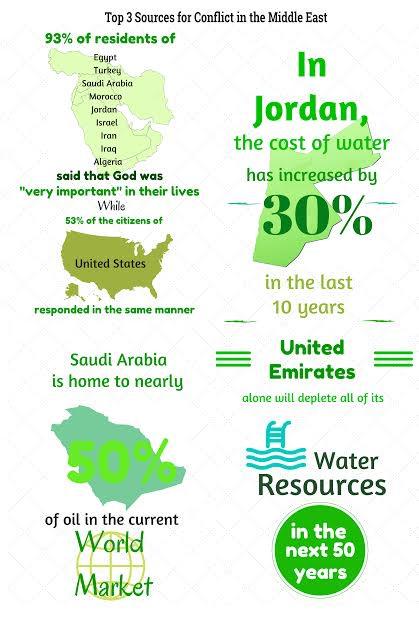Undeniably, the Middle East has numerous issues that cannot be summed up in a column. Some issues, however, have a broader reach than others — they not only influence governmental policy, but also affect the everyday lives of the people that live in the region. I believe there to be three issues that are the top sources of all the major conflicts in the Middle East.
Water
The Middle East, which geographically largely consists of desert, has serious issues with water consumption. To combat this problem, many desalination centers process salty water from the ocean, resulting in water that is adequate for consumption. In fact, Nature Middle East, a Middle Eastern scientific journal, holds that 70 percent of the world’s desalination plants are located in the Middle East. The desalination process, however, is environmentally problematic since leftover salt is often pumped back into the ocean, destroying marine environments. Water issues have caused not only environmental, but also monetary concern for Middle Easterners; in Jordan, the cost of water has increased by 30 percent in the past 10 years, according to a report by The Water Project. The water dilemma is incredibly important to the region and is a central cause of quarrel among countries. The Middle East also needs to focus on this issue because at the current rate of consumption, the Emirates Industrial Bank predicts United Emirates alone will deplete its water resources in less than 50 years.
Oil
For proof that oil is important in the Middle East, look no further than the present effects of Saudi Arabia dropping the price of oil. GEO ExPro, a leading magazine that focuses on the oil and gas industry, holds that this region is home to nearly half of the world’s oil currently in the global market. Furthermore, the oil industry provides innumerable jobs and wealth to inhabitants of the region. As stated in an article in the Journal of American History, the control of oil has helped to preserve security and power in the Middle East for decades. Dominance over this non-renewable resource leads to interesting power dynamics and competition within the region.
Religion
The Middle East is one of the most religiously diverse regions in the world. Besides being home to holy sites for the three main Abrahamic religions — Christianity, Islam and Judaism — this region houses religions including Zoroastrianism, the Druze religion, Buddhism, Yaziti, Samaritanism and the Baha’i faith, among many others. According to a World Values Survey report that collected data between 2005-2007, 93 percent of residents of nine Middle Eastern countries —Egypt, Turkey, Saudi Arabia, Morocco, Jordan, Israel, Iraq, Iran and Algeria — said that God was “very important” in their lives. Meanwhile, only about 53 percent of United States citizens responded alike on the same survey. This medley of beliefs can lead to difference in opinion and conflict, which often leads to religious disputes in the region.
The Middle East is clearly a tumultuous region. Many attempt to trace back the origin of regional conflicts to a single event or circumstance. However, the origins of nearly all of the conflicts in the Middle East can be linked to three elements- water, oil and religion. The simplicity implies that with with a bit of social understanding and political negotiation on three issues there is hope yet for peace in the Middle East.
The next Olive Branch column will be on the Iranian Nuclear Deal. If interested, please send topic requests or further questions to Ariel Cohen, who can be reached at [email protected].
Graphic by Padya Paramita ’18, Graphics Editor





EdelAli | Apr 11, 2015 at 1:44 pm
Only %53 of US citizens compared to %93? And so you say THIS medley of beliefs can lead to REGIONAL conflict? What the hell is US doing in ME??!